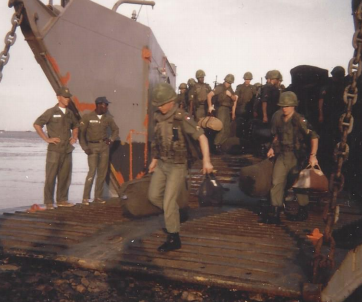I traveled to Vietnam on a USNS Troop Carrier, named the General Rose. After traveling by train from Kansas to Oakland, California, the soldiers of the US 9th Infantry Division boarded the Rose ship and embarked on their journey into combat on December 11, 1966. The last thing I remember seeing as we pulled out of Oakland harbor was the famed prison Alcatraz!
We sailed for several days until we made our first stop in Okinawa where we had a six hour shore leave. We were advised to not get inebriated to the point where we would be unable to make it back to the ship on time. Some of us did not heed that advice and had to be literally carried back from town as the six hour excursion ended.
The General Rose was about twenty years old in 1966 and had seen better days for sure. We wondered if the ship had any stabilizers since it seemed to sway to and fro, up and down endlessly and became progressively worse as we entered the waters of the South China Sea!.. Needless to say, many of us, myself included became horribly seasick. I cannot remember eating anything other than white crackers for the nearly three weeks on board. I had to have lost at least 15 —20 pounds on the trip.
We finally sailed into South Vietnam on December 31, 1966. My recollection is that there was a truce in place at the time and we did not get off of the Rose until January 1, 1967. We exited on landing craft, the same type of carriers that were used for the landing at Normandy during WW2. The difference here was that we carried all of our belongings onto the shore at Vung Tau, our duffel bags, cases, M16’s, flags, banners, etc. Once on shore, we were loaded onto 2 1/2 ton trucks which took us to our new base camp named Bearcat, located approximately 20 miles Northeast of Saigon.
It wasn’t until many years after I had gotten out of the Army that I found out who General Rose, the ship’s namesake was. Major General Maurice Rose was a WW2 Commander of an Armored Division who was shot in the head a few weeks before the end of the war. Had he lived he would have been as well known as Eisenhower, Bradley, Marshall, Patton, etc. Instead, he is virtually unknown by most Americans unfortunately.


